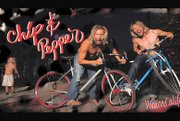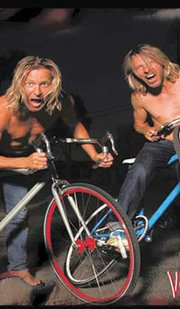Under a New Business Model, Chip & Pepper Debuts Licensed Apparel
Chip and Pepper, the identical twins who parlayed their electrically charged personalities into a premium-denim brand name, have finally gotten separate offices and their own companies after more than 23 years of working together side by side.
In some ways it’s a split. In other ways it’s not.
No matter how you look at it, the two are still involved in denim, just with different business models as their recipe for success.
Pepper Foster, who is 55 seconds older than Chip and the calmer of the hyperactive duo, recently partnered with his father-in-law, Charles Perez, to form Venice Intelligence. Perez is an apparel veteran, having co-founded Los Angeles manufacturer and licensee Paul Davril Inc. in 1974. (He closed it in 2008.)
The formula behind Venice Intelligence is to license the Chip & Pepper label in the United States for anything from shirts and sunglasses to surf boards and sneakers. Recently, Venice Intelligence, whose offices are in the Los Angeles seaside community of Venice, unveiled its new Fall 2010 collection of denim, T-shirts and woven shirts licensed to Makers USA in Los Angeles.
Chip Foster, who says he is a “true denim guy,” is still manufacturing clothes with his Lake Capital company, located a mere five blocks from his brother’s office. He is responsible for the merchandise that fills the one Chip & Pepper store left in Canada and others to follow. He also has the licensing rights to Japan, New Zealand, Canada and Australia. In addition, he has the Mill Iron label with The Buckle chain of stores. Profits from Lake Capital stay with Chip, and profits from Venice Intelligence remain with Pepper and his crew. However, an umbrella company called VPC owns all the Chip & Pepper brands worldwide. Partners in VPC are Perez and the twins.
The new business model and divisions come after the economic downturn put a crimp on the premium-denim business. Many companies saw their sales fall and credit tighten.
Last December, a Los Angeles Superior Court lawsuit filed by Richard Koral, an off-price seller of branded apparel goods, sought repayment of a $2 million loan made in 2007 to L.A. Lab Inc., parent company of the old Chip & Pepper manufacturing venture. While Koral did not return calls for comment, the 46-year-old Canadian twins said the issue has been resolved. Brand extension
With apparel companies having a harder time producing profits, the licensing model seemed the best direction for the blonde twins, who have done everything from host their own cartoon show on NBC to launch a store on Melrose Avenue called Golf Punk. They are following in the footsteps of other Los Angeles brand names, such as Mossimo and Cherokee, that gave up manufacturing for lucrative licensing deals with Target Corp. and mid-range retail chains.
A few years ago, Chip & Pepper extended its brand name by offering moderately priced C7P jeans at JCPenney. That line is no longer offered, but they still supply Foster jeans for $44 to misses customers at the mid-tier retail chain.
“We have never taken advantage of our brand, Chip & Pepper, and now we are going to the next level,” Chip said.
Chip & Pepper’s old offices were in Vernon, Calif., the industrial area that is home to several large apparel companies as well as other businesses. The brothers worked in an industrial neighborhood ever since they formed their denim company in 2003. But with a new direction comes new goals—and new digs.
Inside his new offices, fashioned from a recently constructed two-bedroom loft-style apartment on Abbot Kinney Boulevard, Chip hunkers down with a compact team of long-time collaborators. “I like making clothes for the boutiques, and, on their side, they want to extend the brand,” Chip explained.
From the third-story balcony, which stretches the length of the office/apartment, there is a postcard view of the Santa Monica Mountains and the Hollywood sign. Chip is quite taken with the view and points out the Hollywood sign. “Look, you can see the Hollywood sign,” he gushes three times in one hour after sitting on a kitchen counter and continuously swinging his legs back and forth.
Down the road, Pepper’s offices, also on Abbot Kinney Boulevard, are a tad more commercial but with an artistic flair. Open ceilings and well-placed windows let in an abundance of light. This is the nerve center for the licensing operation. “I’m pretty pumped up about what we are doing,” Pepper said. “I would rather do what we do best, design and marketing, and let someone else ship the goods.”
Head of licensing is Tadd Zarubica, a former partner in Denim of Virtue, who said the company will be looking for deals in several categories. “There are so many products that can be licensed, from hunting gear to outdoor lifestyle to beachwear to towels, and none of that could be done while managing a denim business,” Zarubica said. Two licenses are pending for footwear and childrenswear.
Licensing is a great way to grow a brand if done in the right way, said Meyer Janet, president of Design Plus, a company in Atlanta that builds brands through licensing. “You need for your brand to be iconic or have some sort of unique selling proposition that is an emotional trigger for the consumers,” Janet said, noting that Juicy Couture has been one of the more stellar branding success stories recently. However, overextending the brand to things such as car fresheners can have a detrimental effect.
Right now, Chip & Pepper has one license with Makers USA, which recently produced the Fall 2010 collection of basics with lower price points than last year. “We tried to fit the brand into new price points of $110 to $130 [retail] instead of $175 to $200,” Zarubica said.
The pared-down collection consists of skinny jeans, T-shirts with graphics and woven shirts. One of the best-selling items so far has been the skinny cargo for women, a skinny jean with cargo pockets on the side, said Melinda Lima, who represents the line at the Nine O Seven showroom in The New Mart. Also popular is the moto look, which incorporates cross-stitching at the knees and elsewhere, replicating motorcycle wear.
Chip and Pepper still guide the design direction for the label, but Chip admits that Pepper and Perez have a little more influence than he does. “I don’t have total control on what they do. If they want to make polka-dot pants and I don’t like polka dots, it is up to them. My brother has 100 percent approval rights of what goes in and out of there,” he said. “So if anything goes out crazy, we’ll just blame Pepper.”























